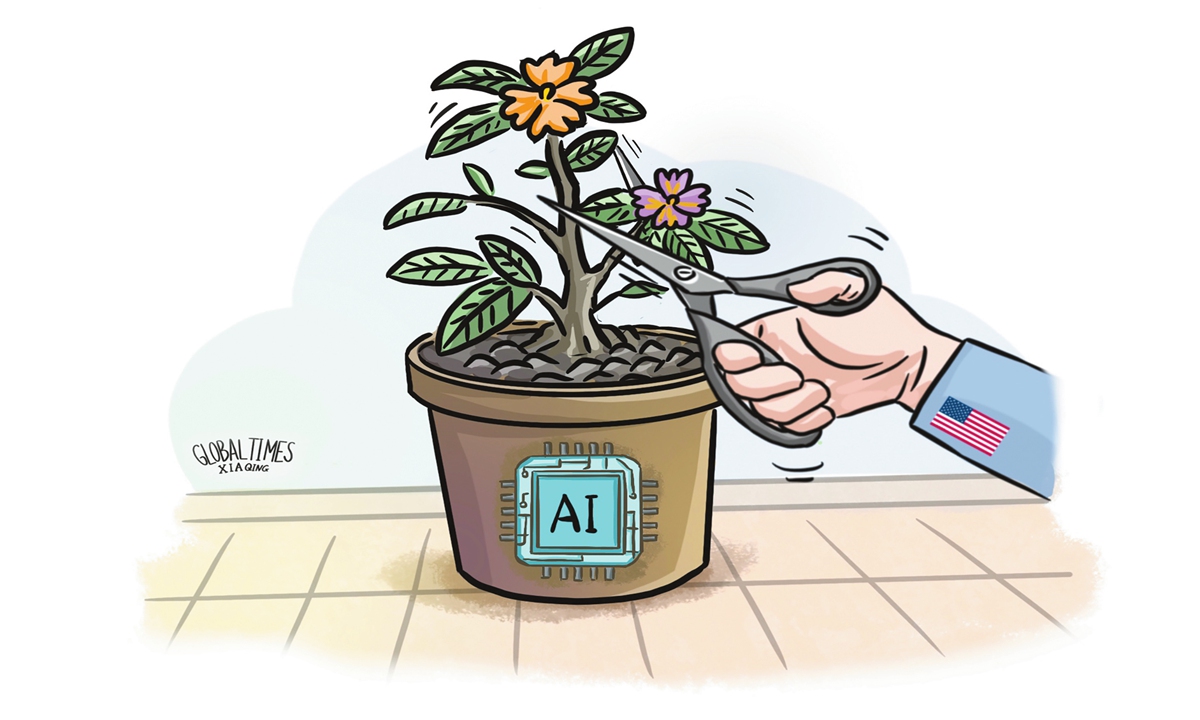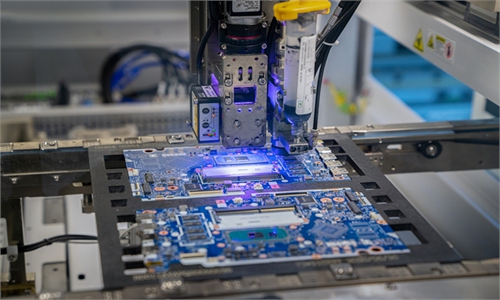
Illustration: Xia Qing/GT
US officials have discussed capping sales of advanced artificial intelligence (AI) chips from Nvidia and other American companies on a country-specific basis, and their focus is on Persian Gulf countries, Bloomberg reported, citing people familiar with the matter. If the report is true, the US semiconductor industry will very likely be the victim as chipmakers lose market share due to sales restrictions.Last year, the US announced measures to expand licensing requirements for exports of advanced chips to more than 40 countries, including some in the Middle East, that "presented risks of diversion to China," according to media reports. The US government is considering further steps to set a ceiling on export licenses for some countries "in the interest of national security," Bloomberg reported on Tuesday.
The boom in generative AI technology has bumped up demand for the hardware required to process the large amounts of data that the development of machine-learning algorithms uses, resulting in a surge in demand for advanced semiconductors. Against this backdrop, many outstanding world-class enterprises in the semiconductor fields see their AI business divisions as the most important sources of profit.
If the US government sets a ceiling on export licenses for certain sales of advanced chips, it is like to downsize US chipmakers' customers, which may undercut their revenue growth potential.
China's AI-related industries are undergoing rapid growth, resulting in a surge in demand for AI computing power and chips. Numerous Chinese AI companies are actively competing to enhance their products by leveraging new AI technologies, engaging in deep learning algorithms and developing pre-trained large language models. This dynamic landscape presents significant opportunities for AI chip manufacturers worldwide.
Previous moves by the US to sever the global semiconductor supply chain and exclude China have proven to be counterproductive. A substantial segment of the clients of American AI chip companies is involved with the global supply chain, with China, Persian Gulf nations and other countries all serving as indispensable parts.
With the accelerated development of AI-related industries in those countries, the growth potential of their markets is immense and promising. If the US further tightens export restrictions on AI chips made by US chip manufacturers, it would undoubtedly harm its own businesses.
In recent years, the US frequently used national security as an excuse to abuse state power and seriously disrupt the global semiconductor supply chain. The ulterior purpose of the move is to restrict the access of certain countries, including and especially China, to advanced chip technology, particularly that used in AI applications, and to suppress the development of AI-related technologies and applications in those countries.
However, things are going in the opposite direction of what US politicians expected. The US restrictions on US chip manufacturers' exports to China will instead accelerate the independent research and development and production of China's chip industry, and this is equally true for the AI chip sector.
The scale of China's chip market has continued to grow in recent years despite US restrictions and containment. According to industry research institutions, China's chip production in the first quarter of 2024 maintained rapid year-on-year growth, and it is expected to reach a high level for the entire year. This demonstrates the strong momentum of China's chip industry.
The tightening of US export restrictions on AI chips will compel Chinese AI enterprises to seek alternatives. This scenario creates a significant opportunity for domestic chip manufacturers to innovate and expand their market presence.
Beyond export controls, Washington seems to have been unable to find many other methods to prolong America's economic and technological hegemony. Thus, the faster the technological progress made by other countries, the more Washington is forced to tighten its export controls while expanding them to a wider range of areas.
However, it has been proven time and again that export controls not only fail to slow down technological development in other countries, but also reduce US companies' customer base. This adds to evidence that Washington's efforts to maintain technological hegemony are unsustainable.
The author is a reporter with the Global Times. bizopinion@globaltimes.com.cn



